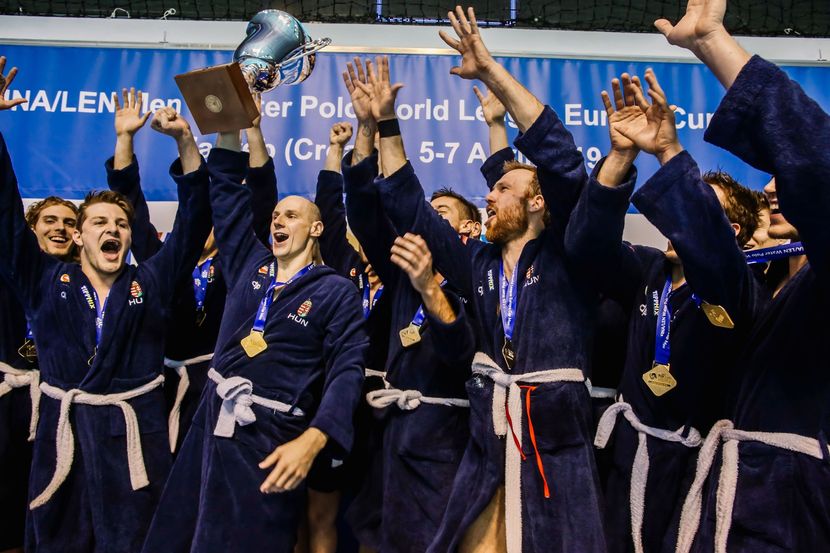
To some’s surprise, Hungary won the World League Europa Cup final in Zagreb after upsetting world title-holder Croatia in an outstanding battle in front of 2,000 fans, thanks to the superb performance of its goalie Viktor Nagy. By beating Italy in a hotly contested bronze medal match, Spain caught the last train going to Belgrade to the World League Super Final in June. The new rules passed the test of the top eight teams of the Old Continent (and arguably of the world) as water polo got significantly faster, pushing the static, centre-forward-targeting game into the shadows.
Hungary went through some ups and downs in recent years, suffered painful losses from Montenegro (Olympics QF, last year’s World League final), was badly beaten by Italy in 2018 (Europa Cup, European Championships) and went down against the Croats in front of 7,000 fans in Budapest in the gold medal match of the 2017 FINA World Championships.
Hungary's rebuilding process seems to be faster than anyone could expect it – Photos: Dino Ninkovic
Now their journey turned into a payback tour here in Zagreb, first they eliminated Montenegro in the quarters, then upset Italy in the semis, and finally took revenge on the Croats in their home in the final.
The game was reminiscent of the 2013 World Championship final where Viktor Nagy played the match of his life while delivering a series of outstanding saves againt Croatia, including stopping two penalties. Now he opened the evening with catching another penalty and then went on denying the Croats on several occasions. The hosts could score only 3 goals in the first half and were kept 1 for 15 in man-ups by the Hungarian defence. At the other end, the Magyars used all their tools to create scoring chances and through their individual skills – and using the new rules which reward drives, swimming and fast moves to make water polo really entertaining – they managed to bother the home defence enough to stage a 4-0 rush to go 6-3 up from 2-3 down. That proved to be decisive as Croatia could never come closer than two goals and after winning the Europa Cup last year, this time they had to settle for the silver while the Magyars added another trophy to their World Cup triumph claimed last September.
Even Croatia's Prime Minister Andrej Plenkovic attended the big match, but the picture - with his son and Olympic champion legend Perica Bukic - was obvisously shot before the final...
The bronze medal match was the hottest one of the day as only the winner could continue its Olympic qualification campaign in the World League (the gold medallist in the Super Final shall be the first team to book its berth in Tokyo). And Spain and Italy came up with an outstanding battle but just like at the European Championships semi-final, the Spaniards took the upper hand. The defences and the goalkeepers were tremendous at both ends but even if the Italians had a better spell in the second period, they could never take the lead.
The bronze medal winning Spanish side was extremely happy
Spain started to dominate in the third when they took a three-goal lead and they were leading by two almost till the very end but Italy then managed to come back to one goal and had a man-up to equalise but failed to put it away and there was no way back for them any more. Spain added one more to win 9-7, earn the bronze medal here and take the last available berth for the Super Final in Belgrade. They deserved it coming on the 'rocky road', as playing Serbia, Croatia and Italy on three consecutive days and winning two of those games was quite a feat from the Spaniards.
The games for the lower placements offered different stories – both ended up in scoring festivals. With only some pride at stake, the teams’ concentration level dropped in defending and that was mirrored by the matches producing 30 and 29 goals respectively. Montenegro upset the Serbs for the 5th place, the Olympic champion team, losing two games in three days, showed some worrying signs that their great generation might have started declining – though at home, in the Super Final in June they could prove that this remark was wrong.
Greece and Russia also did its best in front, the Greeks were mostly in control and they could take at least a win here in Zagreb before returning home.
Final rankings
1. Hungary, 2. Croatia, 3. Spain, 4. Italy, 5. Montenegro, 6. Serbia, 7. Greece, 8. Russia
Individual awards
Best goalkeeper: Marko Bijac (CRO)
MVP of the tournament: Denes Varga (HUN)
Qualified teams from the Europa Cup:
Hungary, Croatia, Italy
Qualified teams from the Intercontinental Tournament:
Australia, Japan, Canada, Kazakhstan
Host:
Serbia
Super Final – 18-23 June, Belgrade (SRB)
Group A: Hungary, Japan, Canada, Spain
Group B: Australia, Croatia, Kazakhstan, Serbia